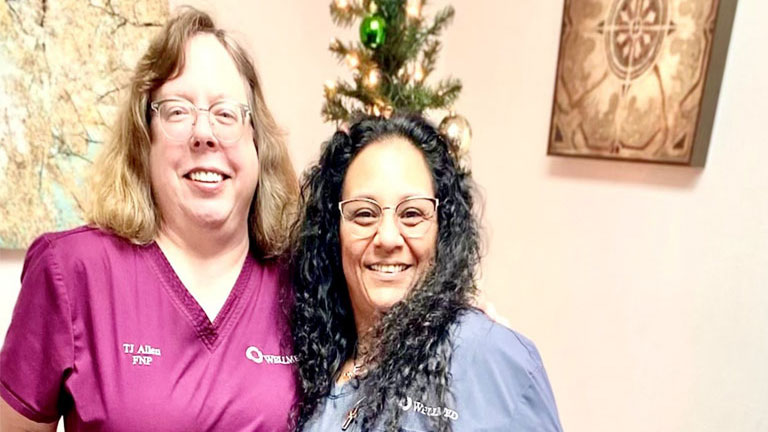Thresia “TJ” Allen and Juanita Herrera
Nurse Practitioner and Medical Assistant, WellMed at Elgin, Elgin, Texas

“In any job, when you see something that isn’t right, you step forward. In this case, it could have been a matter of life or death.”
As soon as Nurse Practitioner Thresia “TJ” Allen walked in the door for a home visit with a patient and his wife, she knew something was wrong.
“The patient looked pale and weak, and his blood pressure was low, but I couldn’t be certain of the cause,” she said. “I was worried, so I had him come in to the WellMed at Elgin (Texas) clinic for a follow-up visit and blood work.”
Medical Assistant Juanita Herrera drew blood from both patients and saw something she had never seen before: neon pink blood serum, often associated with cyanide or carbon monoxide poisoning.
She immediately called NP Allen. “In any job, when you see something that isn’t right, you step forward,” Juanita said. In this case, it could have been a matter of life or death. NP Allen spoke to the patient and he confirmed that the couple’s home was equipped with gas powered appliances. She convinced them to go to the hospital right away for treatment, and promptly notified the local gas company and fire department.
The hospital confirmed NP Allen and Juanita’s suspicions of carbon monoxide poisoning. The investigation for the source of the gas leak is still ongoing, but the patient and his wife are expected to make a complete recovery, thanks to the compassionate, coordinated care they received from their WellMed team.
What everyone should know about CO poisoning:
As the winter months approach and people look for ways to stay warm, everyone should know the sources of carbon monoxide and the early symptoms of carbon monoxide poisoning.
How CO is produced: CO is found in fumes produced by furnaces, kerosene heaters, vehicles warmed up in garages, stoves, lanterns, gas ranges, portable generators, or by burning charcoal and wood. CO from these sources can build up in enclosed or partially enclosed spaces.
How CO harms you: Red blood cells replace oxygen with carbon monoxide, robbing your organs and tissues, including the heart and brain, of vital oxygen. High doses of CO can cause death from asphyxiation or lack of oxygen to the brain.
The symptoms of CO poisoning: The most common symptoms of CO poisoning are headache, dizziness, weakness, nausea, vomiting, chest pain and confusion.
CO poisoning prevention advice from the CDC:
- Check or change the batteries in your CO detector every six months. If you don’t have a
battery-powered or battery back-up CO detector, buy one soon. - Have your heating system, water heater and any other gas, oil, or coal-burning appliances serviced by a qualified technician every year.
- Keep vents and flues free of debris. Debris can block ventilation lines.
- Never leave the motor running in a vehicle parked in an enclosed or partially enclosed space, such as a garage.
- Never run a motor vehicle, generator, pressure washer, or any gasoline-powered engine less than 20 feet from an open window, door, or vent where exhaust can vent into an enclosed area.
- Never use a charcoal grill, hibachi, lantern or portable camping stove inside a home, tent or camper.
- Never run a generator, pressure washer, or any gasoline-powered engine inside a basement, garage, or other enclosed structure, even if the doors or windows are open.
- If you suspect CO poisoning, call 911 or a health care professional right away.
Source: Centers for Disease Control and Prevention
Your health is important to us
Interested in learning more about WellMed? We are happy to help. Please contact our patient advocate team today.
Call: 1-866-323-3601
Email: websitecontactus@wellmed.net
Online: By completing and submitting the “Request an appointment” form, you consent to WellMed contacting you to provide the requested information.
Representatives are available Monday through Friday, 7 a.m. to 6 p.m. CST.
New and existing patients
Request an appointment
"*" indicates required fields


